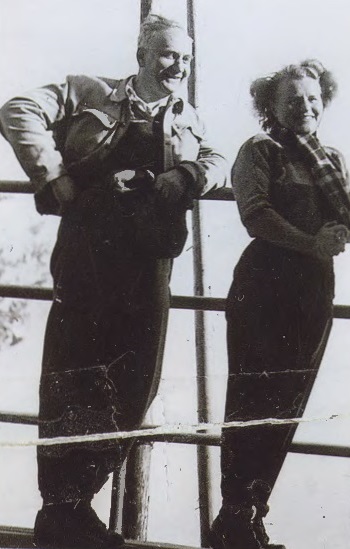
Maryla and Walery Zbijewski on a prewar skiing vacation with Mieczyslaw and Janina Ferster
When the Warsaw ghetto was established in October 1940, Mieczyslaw Ferster, a Jewish engineer who happened to be tall and blond, was begged by his friends not to report to the German occupying authorities. Stating that he would "go where his people will go," Mieczyslaw, his wife Janina (née Totenberg) and their five-year-old daughter Elizabeth entered the ghetto: two years later Mieczyslaw died, most likely from typhoid fever.
Left alone, Janina and Elizabeth managed to survive a few more months, partially thanks to money and packages sent to them by Janina's brother, Roman (Romek) Totenberg, a violinist who had left Poland in 1928 to study in Germany and France, and had then immigrated to the US. When a fellow Polish musician who owned a kiosk just outside of the ghetto heard that Roman's sister was incarcerated inside, he arranged for her photo to be placed on the ID card of a Polish worker allowed to enter the ghetto. Thus, one evening in July 1942, just before the "Great Deportation" of Jews in the ghetto to the Treblinka death camp, Janina walked out clutching her fake ID card, with little Elizabeth following behind, her blond hair and blue eyes belying the stereotyped "Jewish" features expected by the ghetto guards.
Right away, Janina went to the home of her prewar acquaintances – Tadeusz and Eugenia Kucharski. The Kucharskis kindly took them in; the neighbors were told that Janina was the wife of a Polish officer stationed in the UK. When the Russians bombed the nearby railroad tracks in September 1942, the building in which they were staying suffered great damage. Janina decided to take Elizabeth to stay with her old friends, Maryla and Walery Zbijewski, who lived with their two children near the Vistula River. Janina wandered from place to place, supporting herself by selling the valuables she had left with another family before entering the ghetto.
Janina and Elizabeth spent the remainder of the war staying at the homes of various families in the countryside for a few days at a time, not revealing their Jewish origins. After the war, Janina became close to Pawel Kruk, a former neighbor, and they moved in with him. Pawel eventually adopted Elizabeth, and she took his surname.
In 1958, Elizabeth's uncle Roman came to visit his sister and niece in Warsaw. While Janina chose to stay with Pawel in Poland, Roman managed to arrange a student visa for Elizabeth, who studied biochemistry at NYU. In 1963, Elizabeth married Sherwin Wilk, and they had two children – Renata Janina and Susan Fanny – and two grandchildren.
With the help of documentation provided by Elizabeth Wilk, Yad Vashem was able to extend the title of Righteous Among the Nations to the two couples that rescued Janina and Elizabeth Ferster during the war: Tadeusz and Eugenia Kucharski, and Maryla and Walery Zbijewski. While the Kucharskis passed away with no known relatives, the Zbijewskis' grandson Wojciech, today lives in Baltimore. Wojciech accepted the medal and certificate of honor on behalf of his late grandparents at a special ceremony held on 27 January, International Holocaust Remembrance Day, at the Israeli embassy in Washington, DC.









